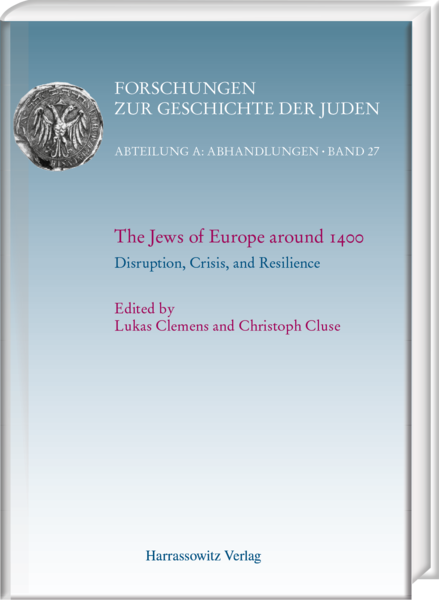 |
Clemens, Lukas Clemens /
Christoph Cluse (eds.):
The Jews of Europe
around 1400. Disruption, Crisis, and Resilience
|
Table of Contents / Inhaltsverzeichnis mit Leseprobe
The Subjects/die Themen - Information of the Publisher/Verlagsinformation
European Jewry around 1400: Disruption, Crisis, and Resilience –
--- Problems and Research Perspectives
--- Iudei ... reversi sunt
Zur Reorganisation jüdischen Lebens in Aschkenas nach 1350
--- Life and Livelihood at Risk: Strategies of Ashkenazi Jews Facing
the Threats of the 1380s and 1390s .
--- Kaufmann von Speyer und die Burg Spangenberg:
Ein Fall individueller Resilienz im späten 14. Jahrhundert
--- The ‘Imagined Communities’ of Yom Tov Lipman Mühlhausen:
Heresy and Communal Boundaries in Sefer Nizzahon
--- Die jiddischen Texte über die Wiener Gesera
--- Ashkenazi Immigrants in Northern Italy and their Relations
with the Italian Jewish Population, ca. 138 - 1420
--- The Migration of German Jews into Italy
and the Emergence of Local Rites of Selihot Recitation
--- German Jews and Ashkenazi Ideas in Venetian Crete .
--- Crise de 1300? Crise de 1400?
Les juifs et la mauvaise réputation
dans les conflits sociaux autour de 1400:
--- Paul de Burgos et Profiat Duran déchiffrent 1391
--- The Jews of Marseilles around 1400:
Crisis of Decline or Crisis of Adjustments?
The period following the ‘Black Death’ of 1348–50, often labelled as an age of crisis and decline in Jewish history, is marked by repeated waves of persecution and expulsion both in the Ashkenazic lands of Central Europe (Germany, Bohemia) and in the Mediterranean world (Spain, Italy, and Crete). At the same time, however, the era was also characterized by dynamic efforts on the part of Jewish individuals and communities all over Europe to cope with outside disruption and internal tensions and to adapt to the changing circumstances.
This collection of essays addresses these processes from various vantage points, investigating the analytical potential of the concept of ‘resilience’ for medieval studies.
Autoren / Authors:
Lukas Clemens and Christoph Cluse, Claude Denjean, Maurice Kriegel, Rena Lauer, Jörg R. Müller, Simon Neuberg, Lucia Raspe, Michael Schlachter, Juliette Sibon, Alessandra Veronese,
Andreas Weber, and Milan Žonca.
Lukas Clemens and Christoph Cluse, Claude Denjean, Maurice Kriegel, Rena Lauer, Jörg R. Müller, Simon Neuberg, Lucia Raspe, Michael Schlachter, Juliette Sibon, Alessandra Veronese,
Andreas Weber, and Milan Žonca.







